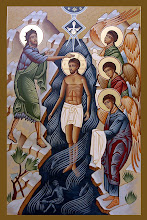This is My Body....This is My Blood
Scripture of the Day: Old Testament-Song of Solomon 7:6-8:14
New Testament-The Gospel According to St. John 6:41-59
Psalms: Morning-99
Evening-8, 118
Icon of the Day: Christ blessing the elements of the Eucharist
The Doctrine of the Real Presence in Christianity: It is perhaps fitting that the daily lectionary for the New Testament today is the area in John's Gospel where Christ refers to His flesh as real food and His blood as real drink. I have been listening to several things today about how the Real Presence in the Eucharist is a Roman Catholic invention.....well, Protestants have another thing coming if they really think that, because the evidence is overwhelming that the church has ALWAYS had SOME form of literal reading of Christ's words. How do I know? Well, for starters....you don't get much more concise than...."This is my body.....This is my blood." The Jews who heard the conversation in John 6 left Jesus because they had trouble with the teaching that He is the manna from Heaven.....but it would be made clearer here....when He blesses the elements of bread and wine and connects them to His fleshly nature. It is also illustrated when He departs from the two at Emmaeus AFTER He blesses the bread! Not before...but after. So as Father Weedon said in the historical liturgy series on Issues Etc. in reference to this event....did Jesus REALLY actually leave them?
What church father before the end of the first millenium denies this fact about the Eucharist and who is not chided by the church catholic for practicing heterodoxy? None. Even St. Augustine who such scholars as Dr. James White quote as reading Christ's words symbolically matured and we are never told if the quote is from "early" or "late" Augustine. He also does not mention Martin Luther's thoughts on the issue, because while Transubstantiation is not accepted, the ancient orthodox and catholic understanding of the Real Presence is, as well as the sacramental nature of it. That is why Luther adored and even worshipped the consecrated bread after the Words of Institution (and why in our Divine Service it is written to make the sign of the cross as the Pastor says "This is my body....This is my blood.). This is not unorthodox nor idolatry....but wholly in keeping with the Old Testament representation of Christ in the Temple.....the bread of the Presence (yes, the P is capitalized....check out your Bible on this).
And now I must go.....for now.....Pax Christi.
New Testament-The Gospel According to St. John 6:41-59
Psalms: Morning-99
Evening-8, 118
Icon of the Day: Christ blessing the elements of the Eucharist
The Doctrine of the Real Presence in Christianity: It is perhaps fitting that the daily lectionary for the New Testament today is the area in John's Gospel where Christ refers to His flesh as real food and His blood as real drink. I have been listening to several things today about how the Real Presence in the Eucharist is a Roman Catholic invention.....well, Protestants have another thing coming if they really think that, because the evidence is overwhelming that the church has ALWAYS had SOME form of literal reading of Christ's words. How do I know? Well, for starters....you don't get much more concise than...."This is my body.....This is my blood." The Jews who heard the conversation in John 6 left Jesus because they had trouble with the teaching that He is the manna from Heaven.....but it would be made clearer here....when He blesses the elements of bread and wine and connects them to His fleshly nature. It is also illustrated when He departs from the two at Emmaeus AFTER He blesses the bread! Not before...but after. So as Father Weedon said in the historical liturgy series on Issues Etc. in reference to this event....did Jesus REALLY actually leave them?
What church father before the end of the first millenium denies this fact about the Eucharist and who is not chided by the church catholic for practicing heterodoxy? None. Even St. Augustine who such scholars as Dr. James White quote as reading Christ's words symbolically matured and we are never told if the quote is from "early" or "late" Augustine. He also does not mention Martin Luther's thoughts on the issue, because while Transubstantiation is not accepted, the ancient orthodox and catholic understanding of the Real Presence is, as well as the sacramental nature of it. That is why Luther adored and even worshipped the consecrated bread after the Words of Institution (and why in our Divine Service it is written to make the sign of the cross as the Pastor says "This is my body....This is my blood.). This is not unorthodox nor idolatry....but wholly in keeping with the Old Testament representation of Christ in the Temple.....the bread of the Presence (yes, the P is capitalized....check out your Bible on this).
And now I must go.....for now.....Pax Christi.


0 Comments:
Post a Comment
<< Home